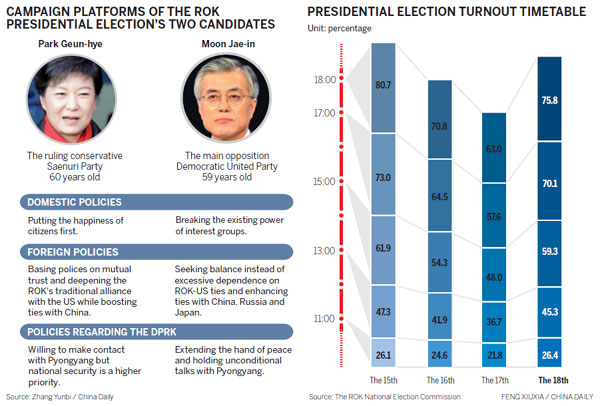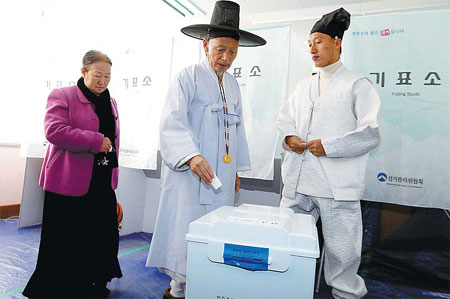ROK elects first woman
|
Yoo Bok-yeob (C), 72, a village schoolmaster, casts his ballot with his family members in the Republic of Korea's presidential election at a polling station in Nonsan, about 190km south of Seoul, on Wednesday. More than 40 million people are eligible to vote in the election. Lee Jae-won / Reuters |
Former leader's daughter wins by slim majority
The Republic of Korea on Wednesday elected a new leader, who convinced the country that she has left the political legacy of her controversial father behind.
Park Geun-hye, 60, defeated liberal Moon Jae-in by a slim margin, marking her the first female leader in a nation long dominated by boardrooms of men and ranked low in terms of gender equality.
The presidential race was a referendum on the legacy of her father, Park Chung-hee, who gained power in a 1961 military coup and ruled the country for 18 years.
Park Geun-hye was already viewed as a powerful figure, having served as first daughter and later first lady of the nation, after her mother was assassinated. Her mother was killed in 1974, and her father was assassinated in 1979.
Park is different from most accomplished ROK women, who started from the ground level and have been victims of discrimination, because "she reached her current position thanks to her father's political glory", Kim Hyun-young, a professor of gender studies at Kookmin University in Seoul, told the London-based The Independent.
But her father's "glory" failed to help her defeat President Lee Myung-bak in the New Frontier Party's leadership running in 2007. Her father's push for industrialization and suppression of dissent became obstacles in the race.
Moon has refused to visit the grave of Park Chung-hee, who put him in prison, and criticized Park Geun-hye for enjoying a luxurious life in the presidential mansion and not understanding the difficulties of ordinary people.
Park, who has never married, recently apologized for her father's deeds, but she also described his coup as "unavoidable and the best possible choice".
Karl Friedhoff of Seoul's Asan Institute for Policy Studies said he believed Park's family ties will not be decisive in the election.
"She has introduced a bill into the National Assembly that victims of her father's rule deserve compensation. But the opposition continues to try to tie her to it," he told the UK Guardian newspaper. Park's 15 years in parliament has often been eclipsed by her background, the newspaper said.
Told of her father's death, she is said to have responded, "Is the border secure?" She has a faint scar on her right cheek from a box-cutter attack she survived while campaigning in 2006 for a seat in the National Assembly.
"We can't say she did this only because of her father," Kim Won-hong, a researcher at Korean Women's Development Institute, told the The Globe and Mail in Toronto.
A Park victory would also represent a major symbolic breakthrough in a region underpinned by Confucianism that says women should be obedient to their husbands, The Independent said.
According to a recent report from the World Economic Forum, the ROK ranks 108th among 135 countries in gender equality.
zhaoshengnan@chinadaily.com.cn




















